- Home
- Laura Purcell
The Shape of Darkness
The Shape of Darkness Read online
THE SHAPE OF DARKNESS
ALSO BY LAURA PURCELL
The Silent Companions
The Corset
Bone China
For Kevin
Contents
Chapter 1
Chapter 2
Chapter 3
Chapter 4
Chapter 5
Chapter 6
Chapter 7
Chapter 8
Chapter 9
Chapter 10
Chapter 11
Chapter 12
Chapter 13
Chapter 14
Chapter 15
Chapter 16
Chapter 17
Chapter 18
Chapter 19
Chapter 20
Chapter 21
Chapter 22
Chapter 23
Chapter 24
Chapter 25
Chapter 26
Chapter 27
Chapter 28
Chapter 29
Chapter 30
Chapter 31
Chapter 32
Chapter 33
Chapter 34
Chapter 35
Chapter 36
Chapter 37
Chapter 38
Chapter 39
Acknowledgements
A Note on the Author
‘… we together called into being, a weird shadow which was neither of us, only an unshapen, unformed thing … the ideas crossed each other as the lines of two wet drawings laid face to face become crossed, blotted, effaced and unrecognisable.’
Elizabeth d’Espérance, Shadow Land or, Light from the Other Side
CHAPTER 1
It is the cocked hat that draws her to him: the way it arches above the barricade of toppers. Its golden edges end low to the brow and gild the face beneath.
He stands talking with half a dozen other gentlemen under the dying bonfire of Sydney Gardens’s autumn foliage, impeding the passage of walkers like a clot in the blood. As he extends a hand, emphasising a point to his nearest companion, Agnes sees it: the perfect pose for a full-length silhouette.
She reaches for the scissors in her reticule but her fingers are cold, fumbling. By the time she has hold of the handles and the sable paper gripped, ready to walk through her hand, the man has already turned and replaced his arm at his side.
She will have to cut him from memory.
There is the familiar slip in her stomach, the tangle of breath within her breast. Hope refuses to die. Never will she see the dark blue coat of the Royal Navy without a wild belief that somehow, somehow …
But this man is not Montague. Even through her cataracts, Agnes can see enough of his features to dismiss that fantasy. If John Montague is still alive – and she has no guarantee of that – he will not be a slim, active man engaged in debate, but a seasoned sailor, even older than herself. Decades on deck will have weathered his skin and aged him beyond his years. There may be a paunch beneath his waistcoat, or a limp from a bullet wound. Her dashing lieutenant belongs only to the past.
She cuts the outline of his face in smooth, bold waves, sliding the paper between the pad of her thumb and the finger that still bears his ring.
The breeze picks up. Her paper flutters, objecting. It has grown damp on the walk and does not hold its form as it should, but Agnes persists.
Once she passes the neck, her work becomes easier. Bodies are a different language. Shoulders with epaulettes, the coat-tails, moving down to the breeches and the lead foot, always cut dead flat. This naval officer must be fresh home. He is not supposed to wear his uniform on furlough. It is a rare sighting, a gift; a glimpse, however tenuous, of a happier time.
Wind gusts. The trees cast their treasuries of gold and bronze down upon the men and an oak leaf, crisp and brown, sticks upright in the rim of the cocked hat. It would be a beautiful detail to include, if Agnes had not cut that shape already.
She moves on to the final curve, the one she must not rush, even though her knuckles are beginning to cramp and … there. The shade emerges from its background, triumphant. Another puff of wind snatches the waste sable paper and sends it, spiralling, into the leaden sky above.
Agnes frowns at her work, dissatisfied. She has overdone the nose and underplayed the chin. This is a nuance people rarely understand about her art: a shadow, an exact replica of the shade a person casts, possesses next to no likeness at all. It must be honed and exaggerated before they will recognise the profile as their own. But she does not have time to make changes. The group of gentlemen are taking their leave. Clouds pillow fast behind the limestone of the old Sydney Hotel.
For all her talent, Agnes cannot work in the rain. It is time to return home.
She plods these days, a legacy of the Accident. Or perhaps she is just getting old. Bath’s streets seem harder to navigate, and the soles of her half-boots slip whenever there are cobbles underfoot. Umbrellas sprout, making the crossing at Pulteney Bridge an ordeal of twice its usual bustle. Damp woollen coats press against her. The kennels run fast in the rain, carrying the odours of horse muck and sewage.
Surely it never used to be like this?
The Bath of Agnes’s childhood was a city of palaces. People came for the cure, of course, but they were not all invalids in Merlin chairs back then; the fashionable paraded in the Pump Room by day and danced in the Assembly Rooms by night. There was always a play or a concert in some white stone mansion.
Now carbon deposits have stained the buildings, giving them a funeral aspect. Dirt bleeds into the river, into the sky. The soul of Bath has left and its body is decaying. Only the Somerset hills glow in the distance, preternaturally vivid.
A horsewhip cracks the air. Agnes pulls up short on the edge of the pavement, just in time. A great cart lumbers past, its wheels squeaking, and splashes her skirts.
By the time she has reached the abbey churchyard, the breath is grating painfully in her lungs. Really, it was foolish to wander as far as Sydney Gardens. Barely two years have passed since pneumonia nearly claimed her life. She had not been strong even before the fever, but when she became lucid again she noticed a profound physical change: her body felt like a stranger’s, unwilling to obey her like it used to.
Take it slowly, Simon counsels her. But it seems, at times, that she has taken her whole life slowly: at the sedate pace of a minuet dance. A spell in the wing chair by the fire, reading Varney the Vampire with her nephew Cedric, will fix her. Illness might have left her frail, but she is not beaten yet.
The rain spits with malice. Mustering all of her energy, she launches herself across the churchyard and round the bulk of the abbey.
Her home cowers in the abbey’s shadow, its walls discoloured by time and soot. Ivy-choked pillars support a portico above the front door. Magpies have taken to nesting here, although there is no sign of them at present. All day long they chitter and cackle, disturbing her work; mocking it, as others do, dismissing it as the vestige of a bygone age.
But to Agnes the black paper shapes in her windows still look as beautiful as ever. The conversation pieces she designed to lure the browsing customer: a group of ladies at tea, horses riding to hounds. Then there are the brighter ovals, painted in Etruscan red; spots of vivid colour on this dreary day.
She is not the only one to view her work with admiration. As she draws closer, she notices two men standing by her parlour window. One consults his pocket watch and then knocks at the front door. From his manner, it appears that he is not knocking for the first time.
Cannot Mamma hear? And where is Cedric – can he really be out playing, in weather like this? Shaking her head, she scurries forward, determined to reach the visitors before they turn away. A fine artist she will look – panting and half-d
rowned – but she cannot afford to lose even a whiff of business.
It is only as the clouds part, letting slip the tiniest ray of light, that she discerns the man rapping on her door is no usual visitor. Raindrops drip from the portico onto his tall, beaver hat.
The stovepipe hat of a policeman.
‘Miss Darken! You see, Sergeant, I am a man of my word. I told you she would not venture far on a day like today.’
Before Agnes can gather her wits, she recognises Simon’s voice; sees Simon’s watery blue eyes reproaching her beneath the sodden brim of his hat.
Simon and a police officer, waiting on her.
‘I … needed some air,’ she explains. ‘I turned back as soon as it started to rain.’ She sounds guilty, like a child caught.
‘Miss Darken, I’m Sergeant Redmayne.’ The policeman possesses a granite slab of a face, unmarked by any trace of a smile. He tips his head forward and water cascades from his hat, wetting her feet.
Agnes represses a sigh. Manners seem to be declining faster than the city itself. ‘And how may I help you, Sergeant?’
‘It’s a tad delicate, miss. Might I come inside?’
Simon clears his throat and fidgets with his collar. No doubt he is thinking the same as Agnes: that the sight of a policeman might set Mamma off on another of her strange turns.
The sergeant’s eyes sharpen at their hesitation.
‘If you must,’ she says begrudgingly. ‘Please excuse the mess. I have been working this morning. I did not expect …’ she gestures at him, ‘you.’
Fishing in her reticule, she produces a set of keys and clunks one awkwardly into the lock. She hopes the sergeant does not notice the tarnished brass of the letterbox, or the magpie droppings plastered on the door panels. Perhaps it is just as well he is not a customer, after all.
Agnes leads them in. No call answers the sound of her footsteps, or the slam of the door behind Simon, who enters last. Cautiously, she peers into the parlour – a small chamber dominated by the fireplace and an old, oaken grandfather clock that wheezes as it ticks. Captain Darken maintained vehemently, until his dying day, that the clock was made with wood from HMS Victory, but Agnes entertains her doubts.
A teacup remains on the side table where she left it, the dregs leaching into the white bone china. Nothing but ash lies in the throat of the fireplace.
Thankfully, Mamma is nowhere to be seen.
‘Here you are.’ She ushers the visitors in, ashamed of the dust and the paintbrushes dotted about the room. Even the profiles framed on the wall seem to avert their faces, refusing to look upon her clutter. ‘Will this take long? Shall I boil water for tea?’
‘That won’t be necessary, Miss Darken.’ Sergeant Redmayne sits heavily in the wing chair.
Agnes would rather change her clothes, stoke up the fire and take some refreshment before he relates whatever he has to tell, but the sergeant’s manner is so grave, so dampening, she can do nothing but take a seat and remove her bonnet, waiting dumbly for his words.
‘I called earlier, but you were out. Instead I met your physician, here.’ He throws Simon a look that would fell a slighter man. ‘Strange enough, he turned up again, just as I came back for a second try.’
‘Fortuitous.’ Simon smiles, but Agnes senses he is not altogether easy. He has not yet sat down.
‘If you say so, Doctor. Look miss, I won’t beat about the bush. You had a Mr Boyle come here for his portrait last Saturday, the twenty-third?’
‘Not quite a portrait, Sergeant. I did some preliminary sketches. He wants the shade painted onto glass and bronzed with detail for his wife. A remembrance for the anniversary of their wedding day, if I recall.’ Agnes twists the limp ribbons on her bonnet. ‘But … how do you know of this?’
‘Mr Boyle wrote the appointment in his engagement diary. Darken, two o’clock.’
‘Yes, that was about the time …’
She is at a loss. What has a police officer to do with her work? She tries to remember this Mr Boyle. An unassuming man, old-fashioned. Not much in the way of a profile, except for his plump lips. The kind of man her sister Constance would have scorned as a fogram.
‘Is Mr Boyle in some kind of trouble?’
‘You could say that, miss. He’s dead.’
‘Dead!’
Simon steps forward. ‘Really, Sergeant, that is not the way to break news to a lady—’
But Sergeant Redmayne carries on regardless, his voice as devoid of emotion as his face. ‘Murdered, in fact. Found the body in the Gravel Walk with the head smashed in. Looks like they did it with a mallet. No doubt the villain wanted to delay the identification of his victim for as long as possible.’
‘Now look here …’ Simon objects.
Agnes is grateful for his bulky presence, and the salts he waves beneath her nose. Their tang acts as a lash, keeping her upright.
‘How hideous,’ she gasps. ‘Who would want to—’
‘That’s what we’re trying to establish. Boyle had a dinner engagement after he saw you, at seven o’clock. Didn’t keep it. But you can confirm he was here?’
Simon finally seats himself at her side. The sofa sags with his weight. Helplessly, her body topples in his direction, leaving her propped against him, shoulder to shoulder, like a house of cards. She rights herself.
‘Yes,’ she replies tentatively. ‘Our business did not take long. One can sketch very quickly, you know …’ To think that her eyes would have been amongst the last to see Mr Boyle alive! It is some consolation to think that she chronicled the lines of his face before they vanished. Or collapsed. A mallet, did the policeman say? ‘We spent longer discussing the final product. I suppose he left me at … a quarter to three?’
Sergeant Redmayne nods. Not once, in the duration of their interview, has Agnes seen him blink. ‘And how did he seem? Agitated? Preoccupied?’
Agnes tries to cast her mind back. Truth be told, Mr Boyle was a forgettable sort of man. Had she been overrun with sitters, as in the old days, she would scarcely have remembered him. As it is, she has an image of his face, turned to the left, captured for the last time on paper. No features, just pencil outlines. Already fading from memory. She had cut him a shade on black paper, to show him how it would look, before he opted for the paint.
‘Oh,’ she breathes on a downward note. ‘Oh, no. He did not pay me.’
‘What?’
‘Mr Boyle was to pay upon collection of the glass painting. It is practically finished. All that work!’
The sergeant clicks his tongue, irritated. ‘I can’t see that as the greater of the two evils, miss. Some would say he has paid the ultimate price.’
‘I do not mean to sound unfeeling. But one cannot eat pity, I cannot heat a house through the winter on pity. I daresay if the police station failed to pay your weekly salary—’
Simon’s elbow nudges her. Perhaps she is being unreasonable. It is the shock. She is not herself.
‘If we might return to how Mr Boyle appeared on the afternoon in question?’
The magpies shuffle in their nest, their feet going tack-tack on the roof.
‘He was … ordinary. So far as a person unacquainted with him can judge. We spoke of his wife and the commission, I believe. Nothing more … He seemed perfectly in spirits. Oh, yes! He made a jest, about a silhouette of my sister. So I did not think him troubled in the least.’
Sergeant Redmayne nods again. ‘I see. Well, perhaps if you do think of anything else, Miss Darken, you’ll wait upon me? I’ll leave my name and direction.’
He produces a calling card from his pocket and pushes it across the side table with his finger.
‘Yes, yes I will.’
‘You may have been the last person to see Mr Boyle alive. Except for the killer, of course. You’d oblige me by remaining in the city.’
She gasps a laugh. ‘Wherever would I go?’
He shrugs and rises to his feet, leaving a watery mark on the wing chair. ‘People go all sorts of pl
aces when the police start asking questions.’
It is Simon’s turn to stand. ‘I will answer for Miss Darken staying in Bath. Her health is not currently strong enough to permit travel in any case. Now,’ he gestures to the door, ‘we have distressed the lady enough for one day.’ The grandfather clock whirrs, preparing to strike the hour. ‘I would be happy to show you out, Sergeant.’
They are finally moving, finally shuffling through the door to the hallway, taking their hard voices and awful tidings with them.
Agnes lets herself fall full-length upon the sofa. Only now does she realise how cold she is, her teeth chattering uncontrollably. She should change out of these wretched, damp clothes, but she has no energy. Every part of her feels heavy.
By and by, Simon’s hand lightly touches the back of her head. ‘Forgive me, Miss Darken. I told that blasted fellow all this would make you ill again. Not that he heeded me. These newfangled police give false consequence to upstarts like him.’
‘I would forgive his impertinence if he had not brought me such dreadful news.’ She coughs. ‘Poor Mr Boyle! My first customer in months!’
‘Hush, now. Hush. You lie there. I will fix you something to drink.’
‘Where is Cedric? Mamma? She must not hear of this—’
‘No.’ He pauses. ‘All is … quiet upstairs.’
‘Thank you, Simon.’
Exhausted, Agnes closes her eyes, but the lack of vision only heightens her aches and her pains. That burning in her chest. A drum pounding, deep in the sockets of her eyes. The sight of that policeman has brought the Accident back with a clarity she would not have supposed possible, after all these years.
The house stretches and pops. She sinks her face into a cushion, ignoring its demands.
When she returns to herself, there is a shawl draped over her. Flames caper in the fireplace. On the side table, a fresh cup of tea steams beside a slice of cake.
Simon sits watching her. He has removed his coat and rolled his shirtsleeves up his broad arms. His right hand nurses a glass containing a whisky-coloured liquid. Opiates, possibly.
‘Tea first,’ he instructs. ‘Then a dose of this to help you sleep.’

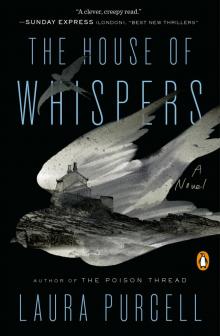 The House of Whispers
The House of Whispers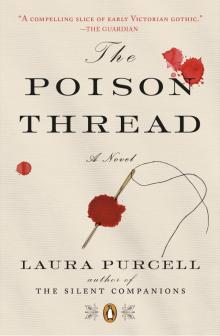 The Poison Thread
The Poison Thread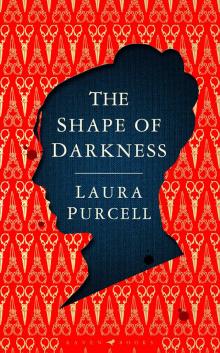 The Shape of Darkness
The Shape of Darkness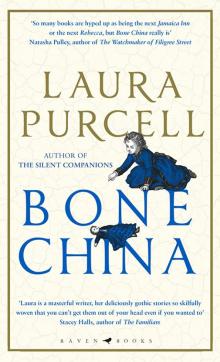 Bone China
Bone China Queen of Bedlam
Queen of Bedlam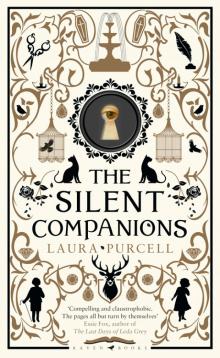 The Silent Companions
The Silent Companions